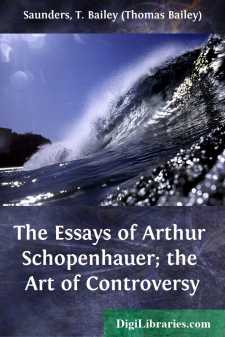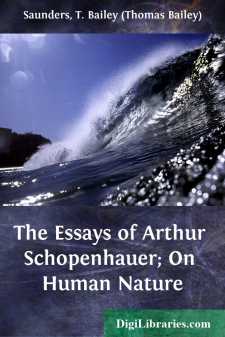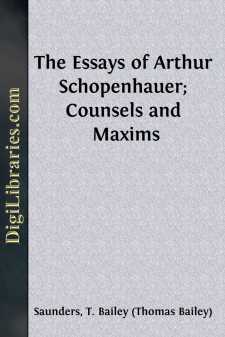Categories
- Antiques & Collectibles 13
- Architecture 36
- Art 48
- Bibles 22
- Biography & Autobiography 813
- Body, Mind & Spirit 142
- Business & Economics 28
- Children's Books 15
- Children's Fiction 12
- Computers 4
- Cooking 94
- Crafts & Hobbies 4
- Drama 346
- Education 46
- Family & Relationships 57
- Fiction 11828
- Games 19
- Gardening 17
- Health & Fitness 34
- History 1377
- House & Home 1
- Humor 147
- Juvenile Fiction 1873
- Juvenile Nonfiction 202
- Language Arts & Disciplines 88
- Law 16
- Literary Collections 686
- Literary Criticism 179
- Mathematics 13
- Medical 41
- Music 40
- Nature 179
- Non-Classifiable 1768
- Performing Arts 7
- Periodicals 1453
- Philosophy 64
- Photography 2
- Poetry 896
- Political Science 203
- Psychology 42
- Reference 154
- Religion 513
- Science 126
- Self-Help 84
- Social Science 81
- Sports & Recreation 34
- Study Aids 3
- Technology & Engineering 59
- Transportation 23
- Travel 463
- True Crime 29
The Essays of Arthur Schopenhauer; the Art of Controversy
Description:
Excerpt
THE ART OF CONTROVERSY.
PRELIMINARY: LOGIC AND DIALECTIC.
By the ancients, Logic and Dialectic were used as synonymous terms; although [Greek: logizesthai], "to think over, to consider, to calculate," and [Greek: dialegesthai], "to converse," are two very different things.
The name Dialectic was, as we are informed by Diogenes Laertius, first used by Plato; and in the Phaedrus, Sophist, Republic, bk. vii., and elsewhere, we find that by Dialectic he means the regular employment of the reason, and skill in the practice of it. Aristotle also uses the word in this sense; but, according to Laurentius Valla, he was the first to use Logic too in a similar way.[1] Dialectic, therefore, seems to be an older word than Logic. Cicero and Quintilian use the words in the same general signification.[2]
[Footnote 1: He speaks of [Greek: dyscherelai logicai], that is, "difficult points," [Greek: protasis logicae aporia logicae]]
[Footnote 2: Cic. in Lucullo: Dialecticam inventam esse, veri et falsi quasi disceptatricem. Topica, c. 2: Stoici enim judicandi vias diligenter persecuti sunt, ea scientia, quam Dialecticen appellant. Quint., lib. ii., 12: Itaque haec pars dialecticae, sive illam disputatricem dicere malimus; and with him this latter word appears to be the Latin equivalent for Dialectic. (So far according to "Petri Rami dialectica, Audomari Talaei praelectionibus illustrata." 1569.)]
This use of the words and synonymous terms lasted through the Middle Ages into modern times; in fact, until the present day. But more recently, and in particular by Kant, Dialectic has often been employed in a bad sense, as meaning "the art of sophistical controversy"; and hence Logic has been preferred, as of the two the more innocent designation. Nevertheless, both originally meant the same thing; and in the last few years they have again been recognised as synonymous.
It is a pity that the words have thus been used from of old, and that I am not quite at liberty to distinguish their meanings. Otherwise, I should have preferred to define Logic (from [Greek: logos], "word" and "reason," which are inseparable) as "the science of the laws of thought, that is, of the method of reason"; and Dialectic (from [Greek: dialegesthai], "to converse"—and every conversation communicates either facts or opinions, that is to say, it is historical or deliberative) as "the art of disputation," in the modern sense of the word. It it clear, then, that Logic deals with a subject of a purely ÐÑ priori character, separable in definition from experience, namely, the laws of thought, the process of reason or the [Greek: logos], the laws, that is, which reason follows when it is left to itself and not hindered, as in the case of solitary thought on the part of a rational being who is in no way misled. Dialectic, on the other hand, would treat of the intercourse between two rational beings who, because they are rational, ought to think in common, but who, as soon as they cease to agree like two clocks keeping exactly the same time, create a disputation, or intellectual contest....





